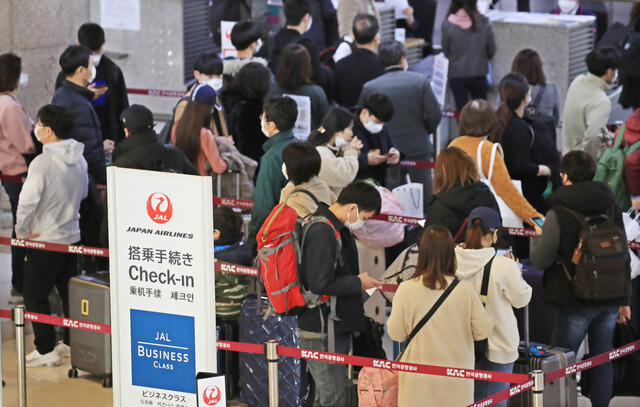hankyoreh
Links to other country sites 다른 나라 사이트 링크
[Editorial] Japan, S. Korea need to stop politicizing coronavirus outbreak and cooperate on preventing it spread

Just after 12:00 am on Mar. 9, South Korea and Japan tightened entry restrictions on each other. While the putative rationale for these measures is preventing the spread of the novel coronavirus, they’re better characterized as a diplomatic tit for tat. It’s wholly undesirable for the fight against the outbreak to escalate into a conflict between these two countries. We urge the two countries to immediately suspend the diplomatic measures they’ve imposed on each other, measures of dubious efficacy, and to shift their focus to discussing how to achieve meaningful cooperation on combatting the disease. Incidentally, the Japanese government is responsible for taking the first step toward a solution, since it was the first to slap entry restrictions on South Koreans.
As of Mar. 9, people visiting Japan from South Korea will be subject to a 14-day quarantine, and entry visas that Japan has already issued are invalidated. South Korea is also being temporarily removed from Japan’s 90-day visa-free program, and Japan has also tightened the rules for issuing new visas. As a reciprocal measure, the South Korean government has invalidated entry visas issued to Japanese citizens and has toughened the procedures for issuing new visas. Furthermore, people entering South Korea from Japan will have to undergo special entry protocols.
It’s the citizens of these two countries that will have to endure the inconvenience brought by these measures. With their visas no longer valid, South Korean students might be unable to return to Japan in time for the spring semester, which starts in April. The same applies for business travelers who need to make frequent trips to Japan. This will inflict considerable damage on the Japanese, too. Japanese newspapers are reporting concerns that policies that prioritize politics over practicality could create serious economic confusion.
If restricting or prohibiting entry to a country is absolutely necessary to keep COVID-19, the disease caused by the novel coronavirus, at bay, such a measure could be justified, regardless of its economic consequences. But the arguments of the Abe administration suggest that its hardline measures were motivated not by the scientific evidence but by the growing criticism it’s facing. While there are more COVID-19 cases in South Korea than Japan, one reason for that is because Japan has been testing far fewer people than South Korea. Thus far, Japan has tested 12,000 individuals for the disease — that’s fewer than the number South Korea tests every day. Such observations back up Prime Minister Chung Sye-kyun’s remark that “it’s doubtful whether Japan has been as transparent and proactive as us [in responding to COVID-19].”
South Korea and Japan need to stop exploiting this outbreak to provoke diplomatic conflict. The correct response is to take advantage of their sophisticated systems of disease control to strengthen their cooperation on the disease. That’s an effective way to both manage bilateral relations and stop the outbreak.
Please direct comments or questions to [english@hani.co.kr]

Editorial・opinion
![[Guest essay] Preventing Korean Peninsula from becoming front line of new cold war [Guest essay] Preventing Korean Peninsula from becoming front line of new cold war](https://flexible.img.hani.co.kr/flexible/normal/500/300/imgdb/original/2024/0507/7217150679227807.jpg) [Guest essay] Preventing Korean Peninsula from becoming front line of new cold war
[Guest essay] Preventing Korean Peninsula from becoming front line of new cold war![[Column] The state is back — but is it in business? [Column] The state is back — but is it in business?](https://flexible.img.hani.co.kr/flexible/normal/500/300/imgdb/original/2024/0506/8217149564092725.jpg) [Column] The state is back — but is it in business?
[Column] The state is back — but is it in business?- [Column] Life on our Trisolaris
- [Editorial] Penalties for airing allegations against Korea’s first lady endanger free press
- [Editorial] Yoon must halt procurement of SM-3 interceptor missiles
- [Guest essay] Maybe Korea’s rapid population decline is an opportunity, not a crisis
- [Column] Can Yoon steer diplomacy with Russia, China back on track?
- [Column] Season 2 of special prosecutor probe may be coming to Korea soon
- [Column] Park Geun-hye déjà vu in Yoon Suk-yeol
- [Editorial] New weight of N. Korea’s nuclear threats makes dialogue all the more urgent
Most viewed articles
- 1Yoon’s broken-compass diplomacy is steering Korea into serving US, Japanese interests
- 2[Guest essay] Preventing Korean Peninsula from becoming front line of new cold war
- 3[Column] Why Korea’s hard right is fated to lose
- 460% of young Koreans see no need to have kids after marriage
- 5S. Korean first lady likely to face questioning by prosecutors over Dior handbag scandal
- 6[Guest essay] Maybe Korea’s rapid population decline is an opportunity, not a crisis
- 7[Column] The state is back — but is it in business?
- 8After 2 years in office, Yoon’s promises of fairness, common sense ring hollow
- 9[Reporter’s notebook] In Min’s world, she’s the artist — and NewJeans is her art
- 10[Editorial] Penalties for airing allegations against Korea’s first lady endanger free press